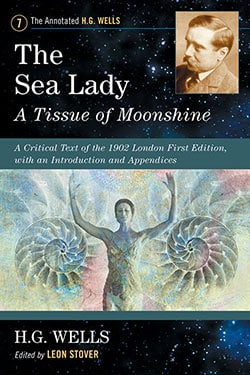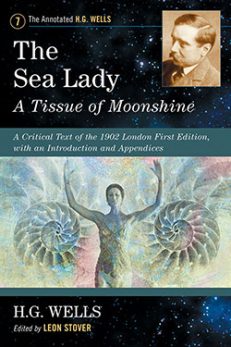The Sea Lady: A Tissue of Moonshine
A Critical Text of the 1902 London First Edition, with an Introduction and Appendices
$29.95
In stock
About the Book
Much attention has been paid to the “scientific romance” novels of H.G. Wells, a founder of modern science fiction and one of the genre’s greatest writers. In comparison, little attention has been given by critics to his works of fantasy, which in the opinion of many, are just as artistic and worthy of study. This work, takes a critical look at Wells’ little known fantasy The Sea Lady: A Tissue of Moonshine, which is “a parable of dark foreboding that unveils the nothingness of utopian dreams” and foreshadows Franz Kafka’s dark fables of the totalitarian age. A lengthy introduction by the editor provides a comprehensive overview of the text and the story of The Sea Lady, and serves to explain the ideas of civil death and every citizen’s acting as a public servant, and the concept of totalitarian metaphysics, which deals with a revolt against the limits of the human condition. This work provides a complete, extensively annotated text of the 1902 London first edition of The Sea Lady.
About the Author(s)
Bibliographic Details
H.G. Wells
Format: softcover (6 x 9)
Pages: 182
Bibliographic Info: 3 photos, annotations, appendices, bibliography, index
Copyright Date: 2012 [2001]
pISBN: 978-0-7864-6875-1
Imprint: McFarland
Series: The Annotated H.G. Wells
Table of Contents
Preface ix
Introduction 1
1 The Text 1
2 The Story 2
3 Civil Death 10
4 Totalitarian Metaphysics 12
The Sea Lady: A Tissue of Moonshine (1902) 17
(Annotated text of the First London edition) 18
Appendices
I: “A Moonlight Fable,” (1909) 153
II: “After a Year of Journalism: An Outbreak of Auto-Obituary,” (1924) 158
III: The Great Outside and Plato 162
Bibliography 165
Index 169
Book Reviews & Awards
“Wells’s masterpieces get the red-carpet treatment here in these luxurious editions…academic collections supporting English departments should definitely invest in this volume”—Library Journal; “Stover is to be thanked for his years of Wellsian scholarship”—Public Library Quarterly; “Stover, by presenting the intellectual underpinnings of Wells’ work, has provided a powerful tool for understanding his writings, one sees them more deeply, without losing that earlier sense-of-wonder that originally opened the vistas of the young reader’s mind…a crucial guide to these classics of science fiction”—Fosfax; “two cheers for Stoverism…formidable scholarship…serious students of Wells would be foolish to ignore ‘Stoverism’”—The Wellsian; “Stover should be commended for a painstaking and meticulous editorial commentary”—Utopian Studies; “extensively annotated and analyzed by Stover…annotations are filled with insights into Wells’ writings and philosophy”—C&RL News.





